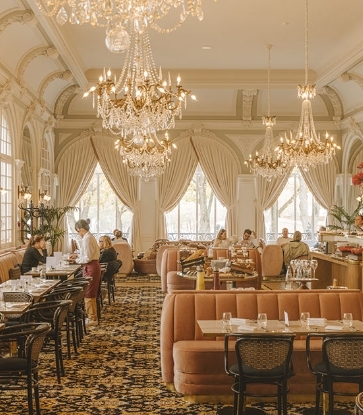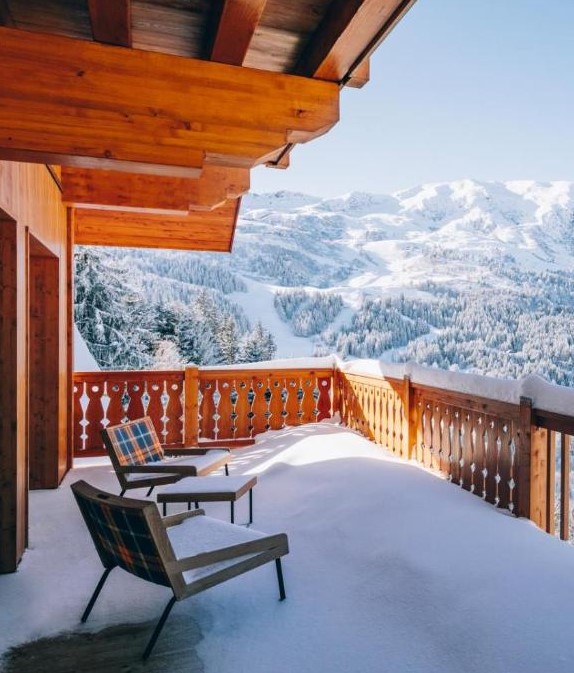Travelers are seeking more artisanal experiences. They’re also increasingly interested in zero-kilometer cuisine. It all adds up to a rise in hotels that combine both desires into one adventurous (and Instagram-ready) package.
Eating may very well be the best part of traveling. It’s hard to think of another activity that, if eliminated, would be as detrimental to the overall travel experience. In our everyday lives we’ll eat unremarkable meals — and we’ll deal with it. But on vacation we want each meal to be a landmark, and a lasting memory.
High expectations for dining go back a long way. A more recent phenomenon is all the food in our social media feeds and streaming platforms. The latter, in particular, continues to reach new heights with its gorgeously realized explorations of how dinner gets from the farm to our forks. From Chef’s Table to Top Chef and every Dave Chang show in between, the sourcing and preparation of food is given levels of attention previously unseen. That influence can’t help but cycle right back into the types of culinary content we see on Instagram, TikTok, et al. And the hotel industry can’t help but react.
The idea of the farm hotel has been around since at least the sixties, when Italian agriturismos began taking shape. Southern Italy struck gold; the surge in demand for zero-kilometer cuisine has led to more agriturismo openings than ever before, and the concept has been quickly replicating around the globe. Travelers are longing to learn more about the food they eat. They want to know exactly where it comes from, and what makes it so good. A growing portion wants to farm it themselves.
Gardens of fruits and veggies, beehives and chicken coops, vineyards, smokehouses — they aren’t just part of the scenery at farm hotels. They’re there for guests to get involved with and educate themselves about. These hotels offer that opportunity, and they don’t skimp on the accommodations either. Get your hands dirty, then get a picture.
Le Germain Charlevoix
Baie-St-Paul, Canada
What isn’t Le Germain Charlevoix? With a complex encompassing a 145-room hotel, a lakeside firepit, a staging ground for mountain sports with its own train station, roaming livestock, and a productive farm with an attached market, it feels more or less like the ideal Québécois village — and that’s exactly the goal. Even the decor is inspired by the local countryside, and each building, though new, sits right where original farm foundations lay.

São Lourenço do Barrocal
Monsaraz, Portugal
São Lourenço do Barrocal is a 200-year-old, 2,000-acre agricultural estate in Portugal’s spectacular Alentejo countryside. Today, the estate is still an organic farm, producing wine, fruits, and myriad other foodstuffs for the hotel’s restaurants and for hosting a seemingly unending list of guest activities and workshops. The rest of the old farming infrastructure has been put to new use as a tranquil and quietly stylish luxury boutique hotel.

Los Poblanos Historic Inn
Albuquerque, New Mexico
A whimsical assortment of animals and plants makes for a highly memorable stay at this experimental Southwestern ranch. We’re talking — in addition to your standard complement of farmyard ungulates — peacocks, lavender, willows, lotus flowers, heirloom roses, and turkeys, among others. The restaurant, Campo, is one of Albuquerque’s best, and features Rio Grande Valley cuisine made from seasonal organic ingredients from the hotel’s organic farm.

Blackberry Farm
Great Smoky Mountains, Tennessee
Along with being well-named, Blackberry Farm is a well-oiled machine when it comes to gathering the requisite ingredients for a full-on foodie experience: teams of gardeners, foragers, brewers, preservationists, and livestock handlers partner with local farmers to generate the decadent final products found in their haute-comfort menus. What’s more, they’re thrilled to walk you through their meticulous process.

Babylonstoren
Simondium, South Africa
Set in the Franschhoek wine country, Babylonstoren is a celebration of food and agriculture: a working farm, a kitchen garden, a farm-to-fork restaurant, and, obviously, a small luxury hotel, complete with an impressive little spa. The style is eclectic, personal, and eminently tasteful, and there are workshops for the whole family, dedicated to everything from beekeeping and charcuterie to all manner of cooking techniques and much more.

Chablé Yucatán
Chocholá, Mexico
Deep in the jungle among Mayan ruins and sacred sites, Chablé is a temple of relaxation. For evidence, look no further than the resort’s spa, built around a natural cenote, a swimming hole sacred to the ancient Maya. Wellness is obviously key here, but if you want to indulge, Chablé makes that easy also: three restaurants designed by a world-class chef offer organic, seasonal ingredients from the same traditional gardens you’re welcome to help tend during your stay.

Sign up, make a list of your favorites, and make a reservation with our booking partners Resy, OpenTable, and Seven Rooms.
Susafa
Polizzi Generosa, Italy
Commanded by the same family for five generations, Masseria Susafa remains a working farm, one with an erstwhile granary and winery transformed into faultlessly cozy platforms for the gastronome and oenophile. For those looking to dive deeper into their dinner, cooking classes allow guests to re-create with their own hands the region’s ancient flavors. It’s hybrid homesteads like this that point the way forward for agritourism as a whole.

Le Manoir aux Quat’Saisons
Great Milton, England
Extensive gardening and cooking classes are what set Le Manoir apart from other English manor house hotels. That, and the unmistakably French influence of MICHELIN Two Star (and Green Star) chef Raymond Blanc OBE. Under the eye of the self-taught Blanc, his eponymous restaurant sources its ingredients from the vast grounds outside, which include 250 varieties of organic fruit and vegetables, a mushroom garden with 20 edible species, and an orchard of apple and pear trees.

Evolve Back, Coorg
Coorg, India
Evolve Back Coorg sits on a 300-acre coffee and spice plantation in India’s Western Ghat mountains. The rustic charm and remote location of this 49-room resort sets it apart from India’s more ordinary luxury hotels. As does its agricultural wonders, which guests are encouraged to interact with as much as possible, not just through walking tours and tastings, but through pruning, harvesting, and tending to the land itself.

Inkaterra Hacienda Urubamba
Urubamba, Peru
The lodge and outlying casitas of Inkaterra Hacienda Urubamba are set on a hundred acres of land on a hillside in Peru’s Sacred Valley. The hotel is sustainable as they come — it grows its own produce via zero-carbon methods, using oxen and hand tools rather than industrial farming techniques. The ten-acre plantation includes crops like corn, quinoa, medicinal herbs, and a variety of potatoes; guests are invited to pick their own.

Companhia das Culturas
Castro Marim, Portugal
A writer/farmer and his wife have turned a working family farm (still growing olives, quince, oranges, figs, and more) into Companhia das Culturas, a nine-room, four-apartment agritourism escape that is tied intimately to the land. You’ll enjoy those ingredients in your meals, and you’ll have the opportunity to participate in farm activities, helping to clear out the land and collect seasonal fruits and other wild edible plants.

Morgan’s Rock Hacienda & Ecolodge
San Juan del Sur, Nicaragua
Morgan’s Rock occupies 4,000 acres of jungle alongside a crescent-shaped beach, and fully half the land is a private reserve — not only do sea turtles nest and hatch here, but the woods are full of howler monkeys, white-tipped deer, and sloths. A large working farm adds cows and chickens, plus fruit and vegetable gardens, and even a sustainable shrimp farm. Guests are welcome to help out by collecting eggs or milking cows.

Lime Wood Hotel
Lyndhurst, England
Situated at the heart of the New Forest, Lime Wood avails itself of two gastronomic heavyweights in Angela Hartnett (of One Star Murano) and Luke Holder. The two have diligently built up a hyper-local culinary empire on site: they grow their own Mediterranean produce in their Victorian greenhouse, cure and mature proteins in their smokehouse, and impart all sorts of culinary techniques via a variety of regularly scheduled cooking classes and exhibitions.

Hôtel Mas de Peint
Arles, France
Hôtel Mas de Peint is a charming seventeenth-century farmhouse, still the homestead of Jacques and Lucille Bon, and surrounded by acres of eco-sensitive ranch and farmland. Dinner is served at large round tables right in the middle of the kitchen, a feat that would be impossible in a less intimate hotel, and features all hyper-local ingredients, including bull meat and rice from the hotel farm, fruits and vegetables from their garden, and more.

Paradero Todos Santos
Todos Santos, Mexico
It’s hard to look past Paradero’s groundbreaking architecture and design. Once you do, you’ll find a farm hotel to rival all others. The hotel’s open-air, farm-to-table restaurant looks out over the garden that supplies its herbs and veggies, as well as 150+ acres of farmland. Even better, on-site classes teach guests the secrets of sustainable farming and gardening. After all the hard work, top it off with a guided tour of the best tacos in Todos Santos.

Hero image: Susafa — Polizzi Generosa, Italy














